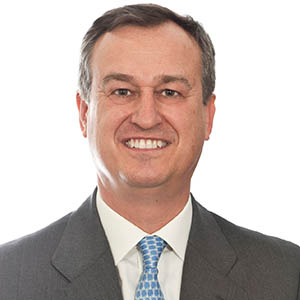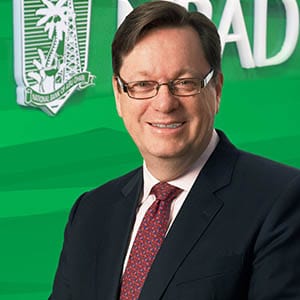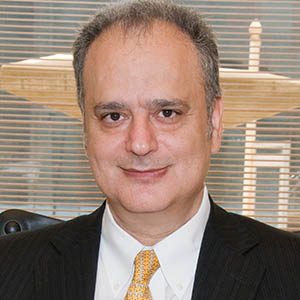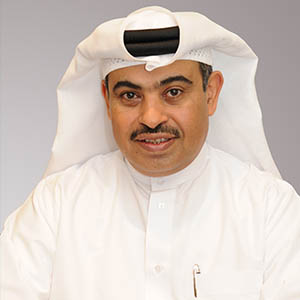
Back To Supplement

FAST MOVER: CÉSAR GONZÁLEZ-BUENO, GULF BANK
It’s been nearly a year since César González-Bueno took the helm at Gulf Bank, and it’s clear the company’s new chief executive hit the ground running. Global Finance interviewed González-Bueno in his Kuwait office, where he spoke about the bank’s resurgence since the financial crisis—and his plans to dramatically expand the company’s footprint and boost profits over the next five years.
Global Finance: How do you feel about the direction the bank is headed in now? Obviously, the bank has had some problems in the past.
González-Bueno: The bank has been cleaned up. I think my predecessors, including the regulator, have done a phenomenal job. The bank is on its feet. You look at the major figures and they reflect that. Because of the high provisioning in the past, many of our assets have more value than their book value.
So the good thing about the bank is that it’s not only very well-provisioned now, but that on top of that, you have assets that have more value than what is reflected in the books.
[The bank is] more solvent than even the numbers reflect, which is why we are getting a lot of traction with rating agencies. It’s because of this new situation of the bank, of being “clean,” that the board decided that it wanted to go more to what we could call a growth model.
GF: So are you talking about expanding the product line or hiking the number of branches. Or are you talking about more acquisitions?
González-Bueno: We are in the process of implementing them and finalizing them—research, implementation and so forth. And there are several sources, there is not only one source of growth. I think we will be more innovative than the average.
GF: Do you plan on offering a larger selection of wealth products?
González-Bueno: That would be one of the elements. We do have mutual funds—some very successful, mainly in real estate. We have just launched another fund that is very attractive. It is replicating trade finance products that have a very stable yield over the years, a very good track record of very stable yields for the most conservative [investor]. We have taken initiatives for this year. Ten of them are related to products and services, both in retail and wholesale, and one of them is around wealth management.
GF: Would you describe these initiatives as a new vision?
González-Bueno: Yes, but not in a grandiose way…. There is no vision in saying that the world is changing at very rapid speed. There is no content in that.
The major thing is implementation, not strategy. Everybody knows that to serve your clients better you have to have better products that differentiate you. The question is, how will you adapt to that and how will you make a difference? The other important question is how are you…going to be a winner in doing that transformation? That is what we are hoping to do better than the rest.
GF: Where do you think the bank will be in five years’ time?
González-Bueno: I think the bank will be more or less twice its current size. The question is what will the profitability be? The profitability will have multiplied by several times.
Back To Supplement

POWER PLAYER: ALEX THURSBY, NATIONAL BANK OF ABU DHABI
In a conversation with Global Finance, Alex Thursby, group chief executive officer at National Bank of Abu Dhabi, talked about the rise of renewable energy in the land of hydrocarbon. He also offered details on the sizable cost of these alternative energy projects—and what that means for banks in the region.
Global Finance: Your recent report says the sources of power in the region are beginning to change. How so?
Alex Thursby: The first thing is, we see that Abu Dhabi has become a significant energy center not just [for] hydrocarbon but also solar [energy]. We see that the energy mix is going to change going forward. What I mean by that is that [the] energy mix is not just an oil and gas and coal game. It’s oil and gas and coal and solar and wind, [which will] grow phenomenally.
GF: Where does the National Bank of Abu Dhabi fit into this changing landscape?
Thursby: We believe that there is going to be a substantive investment required and that there is a potential funding gap for that investment.
GF: Do you believe the bank will be able to fill that funding gap? It’s a large amount.
Thursby: I don’t think we can fund it all. Our report says somewhere in the region of $45 to $48 billion [will be needed] in the next 20 to 25 years. There is a requirement for banks and the financial services sector…in the Gulf to start to service and find a capital markets solution.
GF: When do you think that will commence?
Thursby: There are things that have to happen. The first thing is that regulators and policymakers need to adjust to make sure that the funding structures that are required for renewables and energy as a whole are not crowded out.
GF: What would crowd them out?
Thursby: The liquidity and capital rules that now apply. It’s much harder for banks to lend long-term.
GF: You’re referring to the capital rules for having certain reserves set aside?
Thursby: Yes. Various capital rules and risk-weighted asset calculations.
GF: And easing of these requirements would make it easier for banks to supply the funding needed for alternative energy?
Thursby: From a risk point of view, historical loss on project finance is generally pretty good against other asset classes that the banks hold. I think there is a need to be a little more textured.
The second thing I think that is really important is that debt capital markets educate themselves as to the industry. The third thing that has to happen is that the same has to occur for equity markets.
GF: What is the bank doing to help finance these ambitious projects?
Thursby: Our role is [mani]fold. One, to educate people in the Gulf…by developing a capability to advise clients, particularly on the debt and the debt structuring [side], with a sound understanding of what is a viable model and what is not a viable model. Also, by being able to make the short-term financial instruments that the industry requires.
GF: What would those instruments be?
Thursby: Trade finance and hedging instruments for price risk on solar energy. They’re not all going to come at once. This is what the banks have to do over the period of the next five or 10 years.

PROBLEM SOLVER: MICHEL ACCAD, AL AHLI BANK
Michel Accad took over the CEO role at Al Ahli Bank Kuwait in May 2014. Global Finance met with Accad at his office in Kuwait, where he delineated his mandate at the bank and how he plans to effect it.
Global Finance: You left the Gulf Bank after 30 years and after a difficult period as a result of the financial crisis. What is your mandate here?
Michel Accad: In Gulf Bank the mandate was very clear. The bank had gone through a very traumatic time and was near bankruptcy, and it had to be put back on track.
Here the issue is slightly different because Ahli Bank did not face the same problems as many other banks in the Kuwaiti market. They have been very conservative and avoided most of the pitfalls.
GF: By “conservative” do you mean less engaged in real estate lending?
Accad: Actually there was less appetite for lending as a whole. Maybe not necessarily (just) on the real estate, but also with finance companies. Because they were conservative, they had fewer problems. But when you are conservative, (the downside is) you don’t grow as fast.
GF: There was some criticism of Ahli before you got here that loan revenues were lower than desired.
Accad: Exactly. I think that is what has happened. The good side is, it avoided the problems but at the same time they did lose market share during that whole period. Since 20072008 they had been losing market share. The mandate is to put Ahli bank back on a growth path.
GF: How are you going to do that?
Accad: It is a question first, I think, of redefining your risk appetite. It doesn’t mean that you want to necessarily take more risk in everything that you do, but it means that there are certain areas where you will take a conscious decision to accept more risk.
It means that there are certain sectors, for instance, that the bank may have avoided because it has gotten not such a good experience, although it is mainly a good sector. Think of the contracting sector.
GF: So this is one way in which you are going to work your mandate?
Accad: Yes, in certain sectors (and) in certain business segments. For example we would like to work more with medium-size enterprises on the consumer bank side.
GF: Where do you see the bank in five years?
Accad: What I wish is that you would see a bank that has a larger market share than it has today.
You would see a bank that is probably more relevant and whose brand is much more acknowledged.
Back To Supplement

DRIVER OF DIVERSIFICATION: ALI AHMED ZAYED AL-KUWARI, QATAR NATIONAL BANK
Global Finance sat down with Ali Ahmed Zayed Al-Kuwari, group CEO at Qatar National Bank, at his office in Doha, to discuss Qatar’s economic situation in light of the drop in oil prices.
Global Finance: Let’s start with the drop in oil prices. How is Qatar coping with the loss or revenue?
Al-Kuwari: The government already started this journey [to diversification] much earlier. They used the good days to build very strong reserves and settle the debt, and this is already reflected actually in the government numbers. [The numbers were] also encouraging the private sector. They want to have the private sector lead the economy—not only the government spending. This is very similar [to] what you see in Saudi Arabia, the UAE, [United Arab Emirates] and Arab countries. The journey already started, actually.
The fundamentals remain very good for Qatar. The [government] budget was set at $67 [per barrel]. That was very conservative. The government has the flexibility to manage, to focus on the key projects.
We look to the analysts [who are] talking about $56 on average for 2015, jumping to $60 to $64 by next year and then $69 in the following year. Still, at these numbers, it’s very good.
The government has the flexibility to manage and focus on the anchor projects for Qatar, which are infrastructure projects, and it has sufficient surplus to deal with them.
GF: Given what’s happened with the price of a barrel of oil, will the bank look to alter its business model at all? Will you begin to venture into new areas?
Al-Kuwari: No. We are on our diversification journey [which] started much earlier. When we did the budget, we assumed a much lower number than $60 for the oil, so we are dealing with that conservatively. We have a very strong name, very strong brand, very strongly rated bank, very well-recognized bank: the Qatar champion!
GF: There are basically two pulls going on. One pull says that in order to hedge against the future, banks should diversify. The other is that as the global marketplace changes, some banks may keep more capital at home. Clearly you are committed to Africa, but what is your view of those two seemingly contradictory strategies?
Al-Kuwari: Seventy percent of our business comes from Qatar. Frankly, even if we capture more share in Qatar—let’s say 50%—[it] still would not be sufficient for me to achieve my real [growth] goal, so I will really have to rely on other economies.
GF: Do you think that the banks in Qatar escaped any fallout from the Arab Spring?
Al-Kuwari: Yes, that’s a fair statement. I didn’t see any exposure. We actually did very well and continue to do very well. We did have exposure to some of these countries, but it’s very small and didn’t affect our overall performance.




